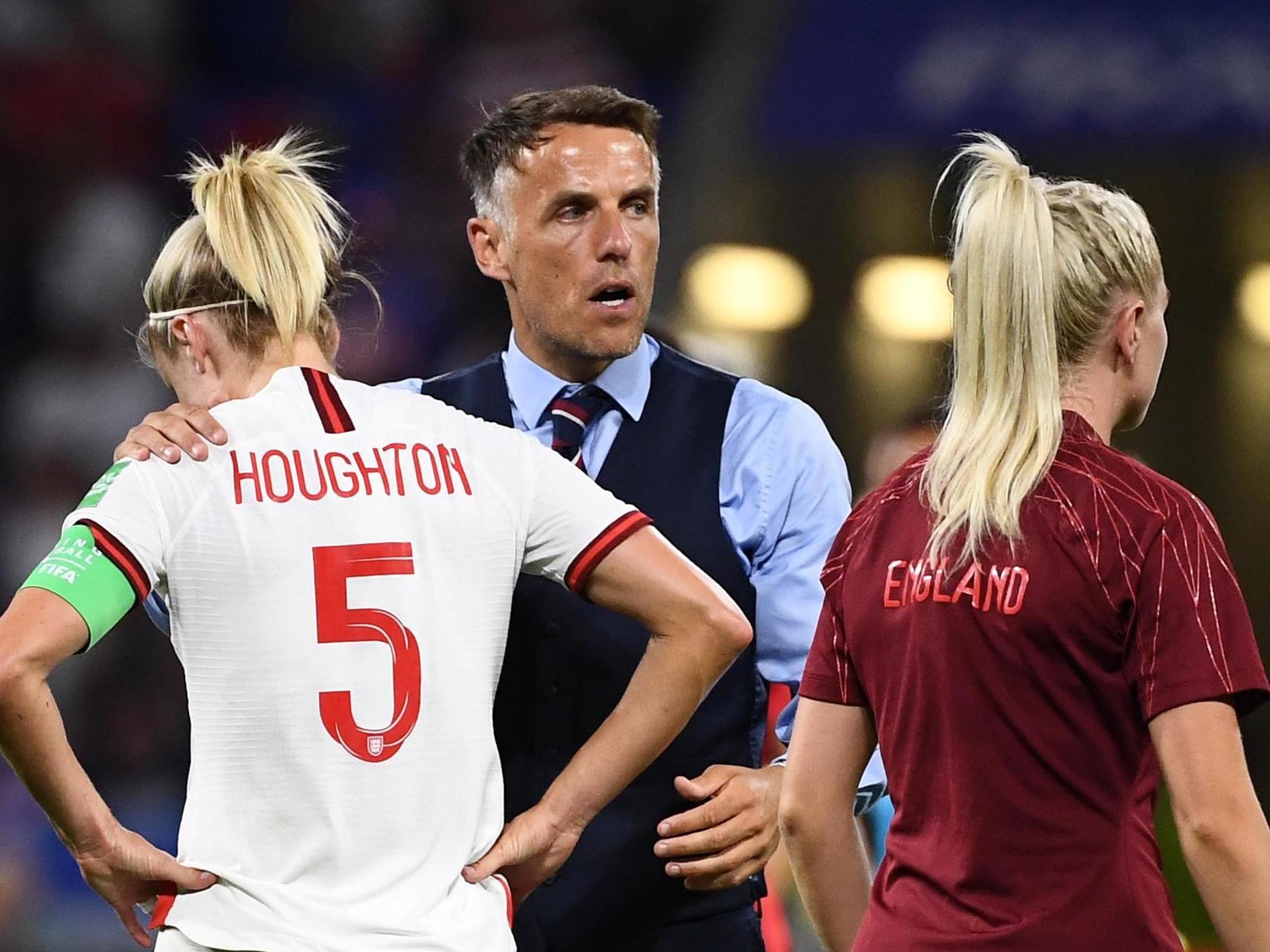England vs USA: World Cup defeat shows Phil Neville and Lionesses still have lessons to learn
If this tournament has shown how far Neville and his players have travelled, elements of the semi-final defeat to the USA showed there is still a way to go

Your support helps us to tell the story
From reproductive rights to climate change to Big Tech, The Independent is on the ground when the story is developing. Whether it's investigating the financials of Elon Musk's pro-Trump PAC or producing our latest documentary, 'The A Word', which shines a light on the American women fighting for reproductive rights, we know how important it is to parse out the facts from the messaging.
At such a critical moment in US history, we need reporters on the ground. Your donation allows us to keep sending journalists to speak to both sides of the story.
The Independent is trusted by Americans across the entire political spectrum. And unlike many other quality news outlets, we choose not to lock Americans out of our reporting and analysis with paywalls. We believe quality journalism should be available to everyone, paid for by those who can afford it.
Your support makes all the difference.It was difficult to believe Phil Neville when he claimed late on Tuesday night that as soon as the final whistle had sounded at the Parc Olympique Lyonnais, his thoughts turned to Saturday's third-place playoff in Nice and next year’s Tokyo Olympics.
This is a manager who has spoken of little else but winning the Women’s World Cup with England. As head coach, he has dedicated almost every hour of his working day to that specific goal. He is a man whose WhatsApp display picture is an image of the trophy itself.
“I’ve moved on from this already,” he told a room of journalists in his post-match press conference, without entirely convincing. “I've started [looking forward] already. I was in a room this afternoon planning the next two years. It's the way I work. It's fast.”
But surely, once Saturday is out of the way, it will be time to slow down and return to this defeat with a cold, analytical eye. Away from the cameras, a coach as attentive as Neville will know that and from a distance, he may well decide he could have done things differently.
Take, for example, the changes: both in personnel and formation. The untested 4-4-2, which became a 4-4-1-1 with Nikita Parris dropping off, did not work.
It did not address the chronic lack of control in midfield that England have experienced against throughout this tournament. It pegged wingers Beth Mead and Rachel Daly further back than in Neville's usual 4-2-3-1 and defensive frailities were still there for all to see.
Then, there were Mead and Daly themselves. They do not deserve to be singled out - Mead set up Ellen White's goal brilliantly - and there is little point debating Neville’s rotation policy. Like the possession-oriented style, it is here to stay. But the England manager himself has admitted that his changes can upset the team’s rhythm. So it was here.
The biggest side-effect of starting Daly on the right was breaking up Lucy Bronze and Parris’ partnership. It is easy to say in hindsight, but that now feels like a mistake. After combing brilliantly against Norway, they were separated here until the final half hour. England only started to threaten regularly once they could combine down the right again.
Crystal Dunn, a natural winger at left-back, was an obvious weak point to target from the start. But by moving Parris central and stationing the more conservative Daly out wide, presumably to combat the Megan Rapinoe threat that never came, Dunn was let off the hook.
The substitutions left something to be desired. Mead departed relatively early, and in her place came Fran Kirby, a talent who has struggled for consistency at this tournament. Georgia Stanway’s introduction would have been more encouraging, and she did eventually arrive, but only in the 88th minute once all seemed said and done.
And then there is the fact that, for a team which builds attacks out from the back and focuses on a shorter passing game, a completion rate of 75 per cent is not ideal. Much of that was due to the US press, but England must learn to cope with coming under pressure on the ball if they are to adopt Neville's preferred approach at this rarefied level.
We should not be too harsh on a team that had as much of the game as their opponents and who were only eliminated by fine margins: a foot straying offside; a tame, late penalty. England were not outclassed, not by any stretch.
A third successive exit in the last four of a major tournament should not necessarily condemn them to ‘semi-final team’ status either. If on the other side of the draw, playing Sweden on Wednesday night instead, they would be well-fancied to progress.

And Neville has won round many of the cynics. His player management skills are there for all to see. He has shown more tactical acumen in the job than many of us gave him credit for, particularly when he took the job 18 months ago.
But if this World Cup showed how far he and his players have travelled, elements of this defeat showed there is still some distance left to go. This latest disappointment may be painful, but Neville and his players would do well not to forget it quickly.
Join our commenting forum
Join thought-provoking conversations, follow other Independent readers and see their replies
Comments